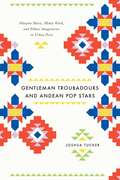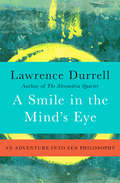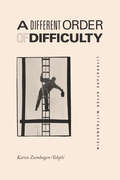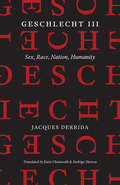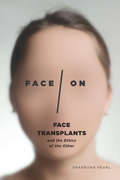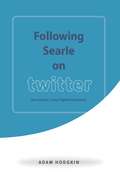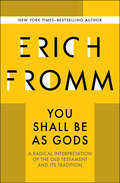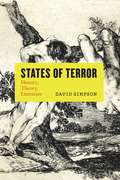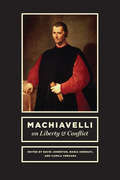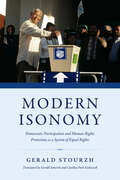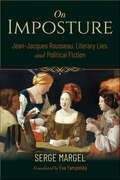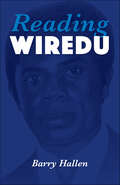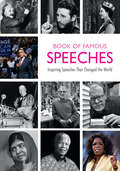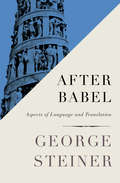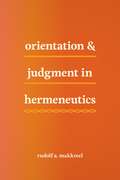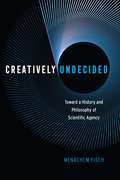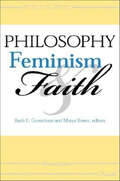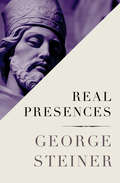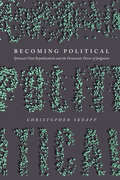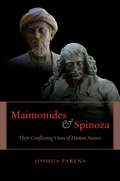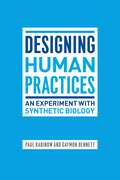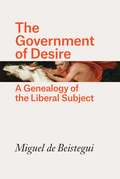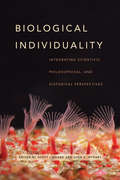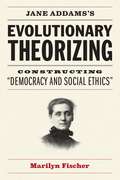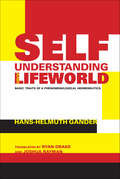- Table View
- List View
Gentleman Troubadours and Andean Pop Stars: Huayno Music, Media Work, and Ethnic Imaginaries in Urban Peru (Chicago Studies In Ethnomusicology Ser.)
by Joshua TuckerExploring Peru’s lively music industry and the studio producers, radio DJs, and program directors that drive it, Gentleman Troubadours and Andean Pop Stars is a fascinating account of the deliberate development of artistic taste. Focusing on popular huayno music and the ways it has been promoted to Peru’s emerging middle class, Joshua Tucker tells a complex story of identity making and the marketing forces entangled with it, providing crucial insights into the dynamics among art, class, and ethnicity that reach far beyond the Andes. Tucker focuses on the music of Ayacucho, Peru, examining how media workers and intellectuals there transformed the city’s huayno music into the country’s most popular style. By marketing contemporary huayno against its traditional counterpart, these agents, Tucker argues, have paradoxically reinforced ethnic hierarchies at the same time that they have challenged them. Navigating between a burgeoning Andean bourgeoisie and a music industry eager to sell them symbols of newfound sophistication, Gentleman Troubadours and Andean Pop Stars is a deep account of the real people behind cultural change.
A Smile in the Mind's Eye: An Adventure into Zen Philosophy
by Lawrence DurrellThe &“virtuoso&” author&’s memoir of his spiritual journey with famed Taoist philosopher Jolan Chang (The New York Times). Beginning with their first meeting over lunch at Lawrence Durrell&’s Provencal home, Durrell and Jolan Chang—renowned Taoist philosopher and expert on Eastern sexuality—developed an enduring relationship based on mutual spiritual exploration. Durrell&’s autobiographical rumination on their friendship and on Taoism recounts the author&’s existential ponderings, starting with his introduction to the mystical and enigmatic &“smile in the mind&’s eye.&” From parsimony, cooking, and yoga to poetry, Petrarch, and Nietzche, A Smile in the Mind&’s Eye is a charming tale of a writer&’s spiritual and philosophical awakening.
A Different Order of Difficulty: Literature after Wittgenstein
by Karen Zumhagen-YekpléIs the point of philosophy to transmit beliefs about the world, or can it sometimes have higher ambitions? In this bold study, Karen Zumhagen-Yekplé makes a critical contribution to the “resolute” program of Wittgenstein scholarship, revealing his Tractatus Logico-Philosophicus as a complex, mock-theoretical puzzle designed to engage readers in the therapeutic self-clarification Wittgenstein saw as the true work of philosophy. Seen in this light, Wittgenstein resembles his modernist contemporaries more than might first appear. Like the literary innovators of his time, Wittgenstein believed in the productive power of difficulty, in varieties of spiritual experience, in the importance of age-old questions about life’s meaning, and in the possibility of transfigurative shifts toward the right way of seeing the world. In a series of absorbing chapters, Zumhagen-Yekplé shows how Kafka, Woolf, Joyce, and Coetzee set their readers on a path toward a new way of being. Offering a new perspective on Wittgenstein as philosophical modernist, and on the lives and afterlives of his indirect teaching, A Different Order of Difficulty is a compelling addition to studies in both literature and philosophy.
Geschlecht III: Sex, Race, Nation, Humanity
by Jacques DerridaA significant event in Derrida scholarship, this book marks the first publication of his long-lost philosophical text known only as “Geschlecht III.” The third, and arguably the most significant, piece in his four-part Geschlecht series, it fills a gap that has perplexed Derrida scholars. The series centers on Martin Heidegger and the enigmatic German word Geschlecht, which has several meanings pointing to race, sex, and lineage. Throughout the series, Derrida engages with Heidegger’s controversial oeuvre to tease out topics of sexual difference, nationalism, race, and humanity. In Geschlecht III, he calls attention to Heidegger’s problematic nationalism, his work’s political and sexual themes, and his promise of salvation through the coming of the “One Geschlecht,” a sentiment that Derrida found concerningly close to the racial ideology of the Nazi party. Amid new revelations about Heidegger’s anti-Semitism and the contemporary context of nationalist resurgence, this third piece of the Geschlecht series is timelier and more necessary than ever. Meticulously edited and expertly translated, this volume brings Derrida’s mysterious and much awaited text to light.
Face/On: Face Transplants and the Ethics of the Other
by Sharrona PearlAre our identities attached to our faces? If so, what happens when the face connected to the self is gone forever—or replaced? In Face/On, Sharrona Pearl investigates the stakes for changing the face–and the changing stakes for the face—in both contemporary society and the sciences. The first comprehensive cultural study of face transplant surgery, Face/On reveals our true relationships to faces and facelessness, explains the significance we place on facial manipulation, and decodes how we understand loss, reconstruction, and transplantation of the face. To achieve this, Pearl draws on a vast array of sources: bioethical and medical reports, newspaper and television coverage, performances by pop culture icons, hospital records, personal interviews, films, and military files. She argues that we are on the cusp of a new ethics, in an opportune moment for reframing essentialist ideas about appearance in favor of a more expansive form of interpersonal interaction. Accessibly written and respectfully illustrated, Face/On offers a new perspective on face transplant surgery as a way to consider the self and its representation as constantly present and evolving. Highly interdisciplinary, this study will appeal to anyone wishing to know more about critical interventions into recent medicine, makeover culture, and the beauty industry.
Following Searle on Twitter: How Words Create Digital Institutions
by Adam HodgkinTwitter allows us to build communities, track celebrities, raise our social profile, and promote a personal brand. Adam Hodgkin thinks Twitter is much more than a mere social media tool—it is a terrain ripe for a conceptual and theoretical analysis of our use of digital language. In Following Searle on Twitter, Hodgkin takes John Searle’s theory of speech acts as Status Function Declarations (SFDs)—speech acts that fulfill their meaning by saying the right words in the right context—as a probe for understanding Twitter’s institutional structure and the still-developing toolset that it provides for its members. He argues that Twitter is an institution built, constituted, and evolving through the use of SFDs. Searle’s speech act theories provide a framework for illuminating how Twitter membership arises, how users of Twitter relate to each other by following, and how increasingly complex content is conveyed with tweets. Using this framework, Hodgkin places language, action, intention, and responsibility at the core of the digital culture and the digital institutions that we are constructing. Combining theoretical perspective with a down-to-earth exposition of present-day digital institutions, Following Searle on Twitter explores how all of our interactions with these emerging institutions are deeply rooted in language, and are the true foundation of social media and contemporary institutions.
You Shall Be as Gods: A Radical Interpretation of the Old Testament and Its Tradition
by Erich FrommFrom the social philosopher and New York Times–bestselling author of The Sane Society: An analysis of the Old Testament as a revolutionary humanist work. The Old Testament is one of the most carefully studied books in the world&’s history. It is also one of the most misunderstood. This founding text of the world&’s three largest religions is also, Erich Fromm argues, an impressive radical humanist text. He sees the stories of mankind&’s transition from divided clans to united brotherhood as a tribute to the human power to overcome. Filled with hopeful symbolism, You Shall Be As Gods shows how the Old Testament and its tradition is an inspiring ode to human potential. This ebook features an illustrated biography of Erich Fromm including rare images and never-before-seen documents from the author&’s estate.
States of Terror: History, Theory, Literature
by David SimpsonHow have we come to depend so greatly on the words terror and terrorism to describe broad categories of violence? David Simpson offers here a philology of terror, tracking the concept’s long, complicated history across literature, philosophy, political science, and theology—from Plato to NATO. Introducing the concept of the “fear-terror cluster,” Simpson is able to capture the wide range of terms that we have used to express extreme emotional states over the centuries—from anxiety, awe, and concern to dread, fear, and horror. He shows that the choices we make among such words to describe shades of feeling have seriously shaped the attribution of motives, causes, and effects of the word “terror” today, particularly when violence is deployed by or against the state. At a time when terror-talk is widely and damagingly exploited by politicians and the media, this book unpacks the slippery rhetoric of terror and will prove a vital resource across humanistic and social sciences disciplines.
Machiavelli on Liberty & Conflict
by Nadia Urbinati Camila Vergara David Johnston, Nadia Urbinati, and Camila VergaraMore than five hundred years after Machiavelli wrote The Prince, his landmark treatise on the pragmatic application of power remains a pivot point for debates on political thought. While scholars continue to investigate interpretations of The Prince in different contexts throughout history, from the Renaissance to the Risorgimento and Italian unification, other fruitful lines of research explore how Machiavelli’s ideas about power and leadership can further our understanding of contemporary political circumstances. With Machiavelli on Liberty and Conflict, David Johnston, Nadia Urbinati, and Camila Vergara have brought together the most recent research on The Prince, with contributions from many of the leading scholars of Machiavelli, including Quentin Skinner, Harvey Mansfield, Erica Benner, John McCormick, and Giovanni Giorgini. Organized into four sections, the book focuses first on Machiavelli’s place in the history of political thought: Is he the last of the ancients or the creator of a new, distinctly modern conception of politics? And what might the answer to this question reveal about the impact of these disparate traditions on the founding of modern political philosophy? The second section contrasts current understandings of Machiavelli’s view of virtues in The Prince. The relationship between political leaders, popular power, and liberty is another perennial problem in studies of Machiavelli, and the third section develops several claims about that relationship. Finally, the fourth section explores the legacy of Machiavelli within the republican tradition of political thought and his relevance to enduring political issues.
Modern Isonomy: Democratic Participation and Human Rights Protection as a System of Equal Rights
by Gerald StourzhUntil the eighteenth century, Western societies were hierarchical ones. Since then, they have transformed themselves into societies dominated by two features: participatory democracy and the protection of human rights. In Modern Isonomy, distinguished political theorist Gerald Stourzh unites these ideas as “isonomy.” The ideal, Stourzh argues, is a state, and indeed a world, in which individual rights, including the right to participate in politics equally, are clearly defined and possessed by all. Stourzh begins with ancient Greek thought contrasting isonomy—which is associated with the rule of the many—with “gradated societies,” oligarchies, and monarchies. He then discusses the American experiment with the development of representative democracy as well as the French Revolution, which proclaimed that all people are born and remain free and with equal rights. But progress on the creation and protection of rights for all has been uneven. Stourzh discusses specifically the equalization of slaves, peasants, women, Jews, and indigenous people. He demonstrates how deeply intertwined the protection of equal rights is with the development of democracy and gives particular attention to the development of constitutional adjudication, notably the constitutional complaint of individuals. He also discusses the international protection human rights. Timely and thought-provoking, Modern Isonomy is an erudite exploration of political and human rights.
On Imposture: Jean-Jacques Rousseau, Literary Lies, and Political Fiction (Studies in Continental Thought)
by Serge MargelImposture is an abuse of power. It is the act of lying for one's own benefit, of disguising the truth in order to mislead. For Jean-Jacques Rousseau, however, imposture is first and foremost power itself. In On Imposture, French philosopher Serge Margel explores imposture within Rousseau's Discourses, Confessions, and Emile. For Rousseau, taking power, using it, or abusing it are ultimately one and the same act. Once there's power, and someone grants themselves the means, the right, and the authority to force another's beliefs or actions, there is imposture. According to Rousseau, imposture can be found through human history, society, and culture. Using a deconstructionist methodin the classic manner of Derrida, On Imposture explores Rousseau's thought concerning imposture and offers a unique analysis of its implications for politics, civil society, literature, and existentialist thought.
Reading Wiredu (World Philosophies)
by Barry HallenReading Wiredu is the first comprehensive overview of the philosophical thought of Kwasi Wiredu. Born in Ghana in 1931, Wiredu, an important observer and critic of philosophy generally, remains an original and penetrating African thinker. Interrelating Wiredu's philosophical writings from across decades, Barry Hallen sets forth the basic tenets and the defining features of his philosophy. Wiredu's thought is divided into five distinct but interconnected areas: his response to the philosophy of Quine on issues of logic and ontology, issues of language in philosophical reflection, the nature of truth as a practical and philosophical concern, the principle of sympathetic impartiality that all human beings must live by to survive as a group, and finally, consensus building as rooted in intentional, negotiated, and rational exchanges that are part of everyday life. Reading Wiredu explores the scope and depth of Wiredu's philosophical thought, which can be framed through what he calls a genetic methodology—a methodology that privileges environmental considerations in the production of various forms of thought. Hallen's overview is intended to assist scholars and students in grasping Wiredu's complex philosophical thought.
Book of Famous Speeches: Inspiring Orations That Changed the World
by Carlo BatàThe Speeches That Defined Our EraWhat were the most important and influential speeches of our time? Discover the answers in this book of speeches that changed our world.Famous historical speeches. This remarkable collection of 38 historic speeches, spanning from post-World War II to the present, offers unparalleled insight into pivotal moments in our recent history. Experience the power of words that shaped nations and understand the visionary minds behind them, from Martin Luther King Jr.'s 'dream' to Malala's impassioned plea for education.Inspiration for the future and insight into the past. In Famous Speeches, gain a deeper understanding of our evolving world through the voices that changed it forever. Travel back to these monumental moments and experience firsthand the transformative power of oration.Inside:Understand the sentiments and visionary ideas of post-World War II leaders and influencersExperience the emotional impact of words that changed the course of historyExplore speeches by statesmen, scientists, literary figures, entrepreneurs, and advocates for educationDiscover inspiration for the future and deepen your knowledge of some of history's greatest speakersIf you liked The Founders' Speech to a Nation in Crisis; Great Speeches by Frederick Douglass; or The Origin of Names, Words and Everything in Between, you’ll love Famous Speeches.
After Babel: Aspects of Language and Translation
by George Steiner&“A brilliant work . . . A dazzling meditation on the very nature of language itself&” from the world-renowned scholar and author of The Poetry of Thought (Kirkus Reviews). In his classic work, literary critic and scholar George Steiner tackles what he considers the Babel &“problem&”: Why, over the course of history, have humans developed thousands of different languages when the social, material, and economic advantages of a single tongue are obvious? Steiner argues that different cultures&’ desires for privacy and exclusivity led to each developing its own language. Translation, he believes, is at the very heart of human communication, and thus at the heart of human nature. From our everyday perception of the world around us, to creativity and the uninhibited imagination, to the often inexplicable poignancy of poetry, we are constantly translating—even from our native language.
Orientation & Judgment in Hermeneutics
by Rudolf A. MakkreelThis book provides an innovative approach to meeting the challenges faced by philosophical hermeneutics in interpreting an ever-changing and multicultural world. Rudolf A. Makkreel proposes an orientational and reflective conception of interpretation in which judgment plays a central role. Moving beyond the dialogical approaches found in much of contemporary hermeneutics, he focuses instead on the diagnostic use of reflective judgment, not only to discern the differentiating features of the phenomena to be understood, but also to orient us to the various meaning contexts that can frame their interpretation. Makkreel develops overlooked resources of Kant’s transcendental thought in order to reconceive hermeneutics as a critical inquiry into the appropriate contextual conditions of understanding and interpretation. He shows that a crucial task of hermeneutical critique is to establish priorities among the contexts that may be brought to bear on the interpretation of history and culture. The final chapter turns to the contemporary art scene and explores how orientational contexts can be reconfigured to respond to the ways in which media of communication are being transformed by digital technology. Altogether, Makkreel offers a promising way of thinking about the shifting contexts that we bring to bear on interpretations of all kinds, whether of texts, art works, or the world.
Creatively Undecided: Toward a History and Philosophy of Scientific Agency
by Menachem FischThomas Kuhn and Karl Popper are believed by many who study science to be the two key thinkers of the twentieth century. Each addressed the question of how scientific theories change, but they came to different conclusions. By turning our attention to ambiguity and indecision in science, Menachem Fisch, in Creatively Undecided, offers a new way to look at how scientific understandings change. Following Kuhn, Fisch argues that scientific practice depends on the framework in which it is conducted, but he also shows that those frameworks can be understood as the possible outcomes of the rational deliberation that Popper viewed as central to theory change. How can a scientist subject her standards to rational appraisal if that very act requires the use of those standards? The way out, Fisch argues, is by looking at the incentives scientists have to create alternative frameworks in the first place. Fisch argues that while science can only be transformed from within, by people who have standing in the field, criticism from the outside is essential. We may not be able to be sufficiently self-critical on our own, but trusted criticism from outside, even if resisted, can begin to change our perspective—at which point transformative self-criticism becomes a real option.
Philosophy, Feminism & Faith (Philosophy of Religion)
by Marya Bower Ruth E. Groenhout"The stories are powerful, sometimes heart-rending, sometimes lyrical, but always deeply personal. And there is some very good philosophizing as part of the bargain." —Merold WestphalHow can the seemingly separate lives of philosopher, feminist, and follower of a religious tradition come together in one person's life? How does religious commitment affect philosophy or feminism? How does feminism play out in religious or philosophical commitment? Wrestling with answers to these questions, women who balance philosophy, feminism, and faith write about their lives. The voices gathered here from several different traditions—Catholic, Protestant, Quaker, Jewish, and Muslim—represent diverse ethnicities, races, and ages. The challenging and poignant reflections in Philosophy, Feminism, and Faith show how critical thought can successfully mesh with religious faith and social responsibility.
Real Presences: Is There Anything In What We Say?
by George SteinerRenowned scholar George Steiner explores the power and presence of the unseen in art. &“It takes someone of [his] stature to tackle this theme head-on&” (The New York Times). There is a philosophical school of thought that believes the presence of God in art, literature, and music—in creativity in general—is a vacant metaphor, an eroded figure of speech, a ghost in humanity&’s common parlance. George Steiner posits the opposite—that any coherent understanding of language and art, any capacity to communicate meaning and feeling, is premised on God. In doing so, he argues against the kind of criticism that obscures, instead of elucidates, meaning. From the power of language to vital philosophical tenets, Real Presences examines the role of meaning and of the spiritual in art throughout history and across cultures.
Becoming Political: Spinoza’s Vital Republicanism and the Democratic Power of Judgment
by Christopher SkeaffIn this pathbreaking work, Christopher Skeaff argues that a profoundly democratic conception of judgment is at the heart of Spinoza’s thought. Bridging Continental and Anglo-American scholarship, critical theory, and Spinoza studies, Becoming Political offers a historically sensitive, meticulous, and creative interpretation of Spinoza’s texts that reveals judgment as the communal element by which people generate power to resist domination and reconfigure the terms of their political association. If, for Spinoza, judging is the activity which makes a people powerful, it is because it enables them to contest the project of ruling and demonstrate the political possibility of being equally free to articulate the terms of their association. This proposition differs from a predominant contemporary line of argument that treats the people’s judgment as a vehicle of sovereignty—a means of defining and refining the common will. By recuperating in Spinoza’s thought a “vital republicanism,” Skeaff illuminates a line of political thinking that decouples democracy from the majoritarian aspiration to rule and aligns it instead with the project of becoming free and equal judges of common affairs. As such, this decoupling raises questions that ordinarily go unasked: what calls for political judgment, and who is to judge? In Spinoza’s vital republicanism, the political potential of life and law finds an affirmative relationship that signals the way toward a new constitutionalism and jurisprudence of the common.
Maimonides & Spinoza: Their Conflicting Views of Human Nature
by Joshua ParensUntil the last century, it was generally agreed that Maimonides was a great defender of Judaism, and Spinoza—as an Enlightenment advocate for secularization—among its key opponents. However, a new scholarly consensus has recently emerged that the teachings of the two philosophers were in fact much closer than was previously thought. In his perceptive new book, Joshua Parens sets out to challenge the now predominant view of Maimonides as a protomodern forerunner to Spinoza—and to show that a chief reason to read Maimonides is in fact to gain distance from our progressively secularized worldview.Turning the focus from Spinoza’s oft-analyzed Theologico-Political Treatise, this book has at its heart a nuanced analysis of his theory of human nature in the Ethics. Viewing this work in contrast to Maimonides’s Guide of the Perplexed, it makes clear that Spinoza can no longer be thought of as the founder of modern Jewish identity, nor should Maimonides be thought of as having paved the way for a modern secular worldview. Maimonides and Spinoza dramatically revises our understanding of both philosophers.
Designing Human Practices: An Experiment with Synthetic Biology
by Paul Rabinow Gaymon BennettIn 2006 anthropologists Paul Rabinow and Gaymon Bennett set out to rethink the role that human sciences play in biological research, creating the Human Practices division of the Synthetic Biology Engineering Research Center—a facility established to create design standards for the engineering of new enzymes, genetic circuits, cells, and other biological entities—to formulate a new approach to the ethical, security, and philosophical considerations of controversial biological work. They sought not simply to act as watchdogs but to integrate the biosciences with their own discipline in a more fundamentally interdependent way, inventing a new, dynamic, and experimental anthropology that they could bring to bear on the center’s biological research.Designing Human Practices is a detailed account of this anthropological experiment and, ultimately, its rejection. It provides new insights into the possibilities and limitations of collaboration, and diagnoses the micro-politics which effectively constrained the potential for mutual scientific flourishing. Synthesizing multiple disciplines, including biology, genetics, anthropology, and philosophy, alongside a thorough examination of funding entities such as the National Science Foundation, Designing Human Practices pushes the social study of science into new and provocative territory, utilizing a real-world experience as a springboard for timely reflections on how the human and life sciences can and should transform each other.
The Government of Desire: A Genealogy of the Liberal Subject
by Miguel de BeisteguiLiberalism, Miguel de Beistegui argues in The Government of Desire, is best described as a technique of government directed towards the self, with desire as its central mechanism. Whether as economic interest, sexual drive, or the basic longing for recognition, desire is accepted as a core component of our modern self-identities, and something we ought to cultivate. But this has not been true in all times and all places. For centuries, as far back as late antiquity and early Christianity, philosophers believed that desire was an impulse that needed to be suppressed in order for the good life, whether personal or collective, ethical or political, to flourish. Though we now take it for granted, desire as a constitutive dimension of human nature and a positive force required a radical transformation, which coincided with the emergence of liberalism. By critically exploring Foucault’s claim that Western civilization is a civilization of desire, de Beistegui crafts a provocative and original genealogy of this shift in thinking. He shows how the relationship between identity, desire, and government has been harnessed and transformed in the modern world, shaping our relations with others and ourselves, and establishing desire as an essential driving force for the constitution of a new and better social order. But is it? The Government of Desire argues that this is precisely what a contemporary politics of resistance must seek to overcome. By questioning the supposed universality of a politics based on recognition and the economic satisfaction of desire, de Beistegui raises the crucial question of how we can manage to be less governed today, and explores contemporary forms of counter-conduct. ?Drawing on a host of thinkers from philosophy, political theory, and psychoanalysis, and concluding with a call for a sovereign and anarchic form of desire, The Government of Desire is a groundbreaking account of our freedom and unfreedom, of what makes us both governed and ungovernable.
Biological Individuality: Integrating Scientific, Philosophical, and Historical Perspectives
by Lynn K. Nyhart Scott Lidgard and Lynn K. NyhartIndividuals are things that everybody knows—or thinks they do. Yet even scholars who practice or analyze the biological sciences often cannot agree on what an individual is and why. One reason for this disagreement is that the many important biological individuality concepts serve very different purposes—defining, classifying, or explaining living structure, function, interaction, persistence, or evolution. Indeed, as the contributors to Biological Individuality reveal, nature is too messy for simple definitions of this concept, organisms too quirky in the diverse ways they reproduce, function, and interact, and human ideas about individuality too fraught with philosophical and historical meaning. Bringing together biologists, historians, and philosophers, this book provides a multifaceted exploration of biological individuality that identifies leading and less familiar perceptions of individuality both past and present, what they are good for, and in what contexts. Biological practice and theory recognize individuals at myriad levels of organization, from genes to organisms to symbiotic systems. We depend on these notions of individuality to address theoretical questions about multilevel natural selection and Darwinian fitness; to illuminate empirical questions about development, function, and ecology; to ground philosophical questions about the nature of organisms and causation; and to probe historical and cultural circumstances that resonate with parallel questions about the nature of society. Charting an interdisciplinary research agenda that broadens the frameworks in which biological individuality is discussed, this book makes clear that in the realm of the individual, there is not and should not be a direct path from biological paradigms based on model organisms through to philosophical generalization and historical reification.
Jane Addams's Evolutionary Theorizing: Constructing “Democracy and Social Ethics”
by Marilyn FischerIn Jane Addams’s Evolutionary Theorizing, Marilyn Fischer advances the bold and original claim that Addams’s reasoning in her first book, Democracy and Social Ethics, is thoroughly evolutionary. While Democracy and Social Ethics, a foundational text of classical American pragmatism, is praised for advancing a sensitive and sophisticated method of ethical deliberation, Fischer is the first to explore its intellectual roots. Examining essays Addams wrote in the 1890s and showing how they were revised for Democracy and Social Ethics, Fischer draws from philosophy, history, literature, rhetoric, and more to uncover the array of social evolutionary thought Addams engaged with in her texts—from British socialist writings on the evolution of democracy to British and German anthropological accounts of the evolution of morality. By excavating Addams’s evolutionary reasoning and rhetorical strategies, Fischer reveals the depth, subtlety, and richness of Addams’s thought.
Self-Understanding and Lifeworld: Basic Traits of a Phenomenological Hermeneutics (Studies in Continental Thought)
by Hans-Helmuth GanderWhat are the foundations of human self-understanding and the value of responsible philosophical questioning? Focusing on Heidegger's early work on facticity, historicity, and the phenomenological hermeneutics of factical-historical life, Hans-Helmuth Gander develops an idea of understanding that reflects our connection with the world and other, and thus invites deep consideration of phenomenology, hermeneutics, and deconstruction. He draws usefully on Husserl's phenomenology and provides grounds for exchange with Descartes, Dilthey, Nietzsche, Gadamer, Ricoeur, and Foucault. On the way to developing a contemporary hermeneutical philosophy, Gander clarifies the human relation to self in and through conversation with Heidegger's early hermeneutics. Questions about reading and writing then follow as these are the very actions that structure human self-understanding and world understanding.
